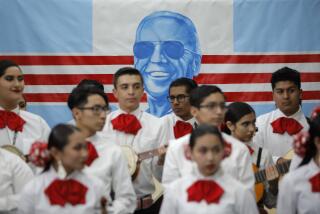Latinos and the Lottery
- Share via
Gamboa’s opinion as to the nefarious effects of the state lottery on the “poor” strikes me as too facile. If Gamboa’s premise stands up, it suggests then that the poor are unwittingly compelled to assist in the lottery’s alleged regressive subsidy of education. The main evil of this, so Gamboa advises, is the absence of any direct relation between lottery spending and education subsidies on a county-by-county basis.
If Gamboa’s point is the futility of lottery tickets, I am in accord. But his depiction of “the vulnerable immigrant and poverty-level population” who are apparently unable to resist the lottery’s temptation is patronizing and unfounded at best. Has Gamboa conducted a thorough psychological study detailing the effects of lottery advertising on these “vulnerable” individuals? Do not get me wrong. I am no lottery enthusiast. I, probably like Gamboa, view the lottery as a waste of time.
But I simply cannot accept his view that the poor have been compelled on a systematic basis to buy lottery tickets. If the poor are getting a raw deal because of the lottery’s regressive education subsidy, they should then refuse to participate. Whatever happened to personal will or restraint? If there is victimization in this, surely it is self-induced.
Like it or not, the democratic process ushered in the state lottery. And like it or not, this goes hand-in-hand with market democracy--the ability to choose to participate in the lottery despite its inherent futility. While I sympathize with Gamboa’s intentions, I simply cannot agree that the poor need to be protected from themselves.
MICHAEL G. RHODES
Newport Beach
More to Read
Sign up for Essential California
The most important California stories and recommendations in your inbox every morning.
You may occasionally receive promotional content from the Los Angeles Times.












